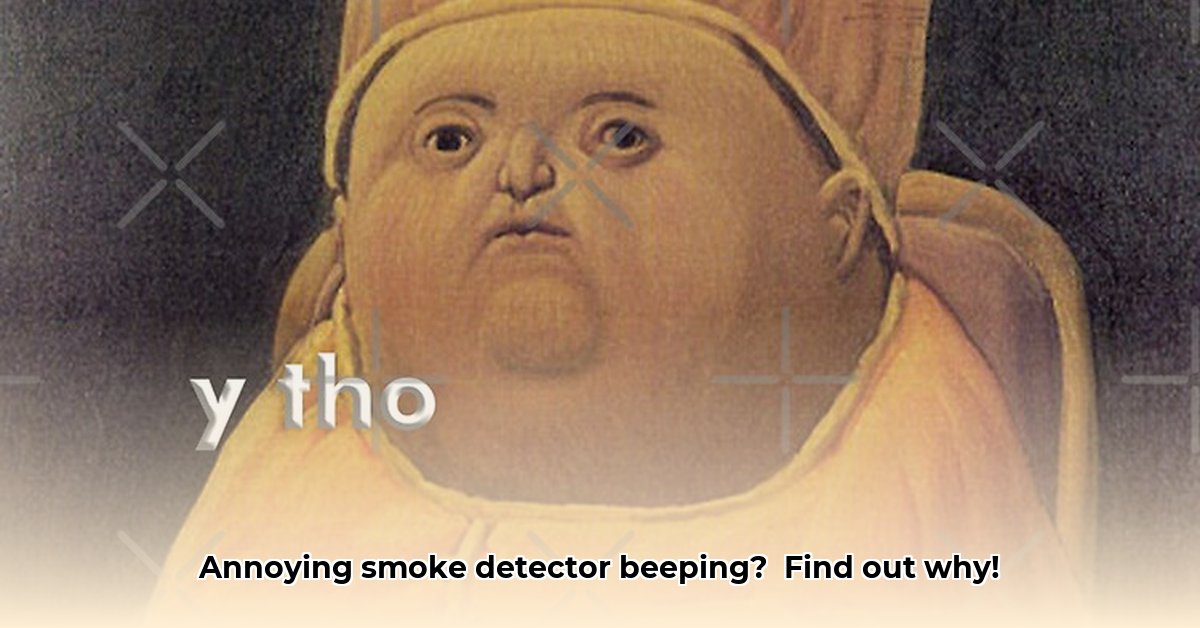That annoying beep from your smoke detector? Don’t ignore it! It’s a serious signal that something needs attention, and ignoring it could be risky for you and your family. This guide will walk you through the most common reasons why your smoke detector is beeping, from the easy fixes (like changing a battery) to slightly trickier problems. For more home safety tips, check out our guide on common home appliance issues. Whether it’s a constant beep, a series of chirps, or something else, we’ll show you how to figure out what’s wrong and fix it. We’ll cover everything from quick battery swaps and cleaning to tips on keeping your detector in top shape for years to come. Let’s get that beep to stop and keep your home safe!
Understanding Smoke Detector Beeps: Decoding the Signals for Home Safety
That persistent beeping from your smoke detector? It’s not just annoying; it’s a crucial signal that needs your attention. Ignoring it could put your family at risk, so let’s figure out what’s going on and get that thing quiet (the right way!), and improve your home safety systems.
Decoding Your Smoke Detector’s Secret Language: What Those Beeps Mean
That irritating beep isn’t random – it’s your smoke detector’s way of talking to you! Different sounds mean different things. A single, occasional chirp, like a little bird, usually means the battery is getting low. But if you hear a series of rapid beeps – like a frantic woodpecker – that suggests a more serious issue, possibly a faulty sensor or (hopefully not!) a real fire. And a loud, steady alarm? That’s the big one – evacuation time!
Understanding these signals is key to keeping everyone safe. Think of it like learning a new language – once you know the basics, you can communicate effectively. Did you know that correctly interpreting these beeps can improve your home’s fire safety rating?
Troubleshooting Your Smoke Detector: A Step-by-Step Guide to Silence the Alarm
Here’s a simple, step-by-step guide to help you troubleshoot your beeping smoke detector. Don’t worry, it’s easier than you think! Regular smoke detector maintenance is something all homeowners should consider.
Step 1: Battery Check-Up – The Most Common Culprit
- Find the battery compartment, usually on the back of the detector.
- Check what type of battery it uses (usually a 9-volt).
- Replace the battery with a fresh one, making sure it’s securely in place.
Why does a low battery cause beeping? Simply put, the detector is running out of juice and needs a power boost to keep doing its job. This is the most likely reason for beeping and usually is the simplest fix.
Step 2: Give Your Smoke Detector a Spa Day – Cleaning the Sensor
- Dust and debris can clog the smoke detector’s sensor, making it less sensitive.
- Gently use a vacuum cleaner with a brush attachment or compressed air (like the kind used for cleaning electronics) to carefully clean the tiny openings on the sensor. Avoid using anything harsh or wet.
- Regular cleaning not only keeps the beeping at bay, it helps extend the life of your smoke detector.
Step 3: Smoke Detector Check-Up – The Test Button
- Most smoke detectors have a small test button.
- Press it – you should hear a loud beep, confirming the alarm is working.
- Doing this once a month helps you catch problems early.
Step 4: Hardwired Detectors: Checking the Wiring
If your smoke detector is wired directly into your home’s electrical system, things get a bit more complicated.
- First, check the circuit breaker to make sure the power isn’t tripped.
- Carefully inspect the wires for any visible damage or loose connections.
- If you aren’t comfortable working with electrical wiring, call a qualified electrician. Electrical work can be dangerous if mishandled.
Step 5: Age Matters – When to Replace Your Smoke Detector
Smoke detectors don’t last forever. They generally have a lifespan of about 8 to 10 years. Even if it seems to be working fine, it’s best to replace it after that time. Old detectors can become unreliable. Homeowners should check detector lifespan regularly.
Step 6: The Persistent Beeper – When to Call in the Experts
If you’ve tried all the above steps and your smoke detector is still beeping, it’s time to call a professional. There might be an internal problem requiring repair or a complete replacement. Don’t delay – your safety and peace of mind are worth it. Are you familiar with the best fire safety experts in your area?
Step 7: Preventative Maintenance: A Simple Schedule for Peace of Mind
Regular maintenance is like regular car check-ups; it prevents headaches down the road and keeps things running smoothly. You should maintain fire safety devices because doing so could save your life.
| Task | Frequency | Why It Matters |
|---|---|---|
| Battery Change | Every six months | Prevents low-battery beeps and ensures reliable operation. |
| Sensor Cleaning | Twice a year | Removes dust and debris, maintaining sensitivity. |
| Test the Alarm | Once a month | Verifies the alarm functions correctly and identifies potential problems early. |
Preventative Measures: Keeping Your Smoke Detector Happy (and You Safe!)
Think of regular maintenance as small investments in your family’s safety. Just like you wouldn’t drive a car without regular check-ups, don’t neglect your smoke detectors. By performing these simple steps, you’ll drastically reduce the chances of unexpected beeps and ensure your smoke detector is ready to protect your family. Your peace of mind is priceless.
In Case of a Real Emergency: What to Do When the Alarm Sounds
If you hear a loud, continuous alarm, it’s not a drill. This is the real deal – evacuate your home immediately and call emergency services. This is crucial! Your life and the lives of those in your home depend on it.
Remember, a working smoke detector is your first line of defense against fire. By taking proactive steps to maintain your smoke detector and address any beeps promptly, you’re creating a safer and more secure home environment. Your peace of mind is priceless.
How to Troubleshoot Intermittent Smoke Detector Chirping in Hardwired Systems
That annoying chirp from your smoke detector? Let’s silence it. Hardwired smoke detectors provide vital protection, but intermittent chirping can be unsettling. Let’s troubleshoot the problem systematically. Make sure all home alarms are connected the best way.
Understanding the Chirps
Different beeps mean different things. A steady, loud beep usually means a fire. A quick chirp, however, often signals trouble. The most common culprit? A low battery, even in a hardwired system. Your hardwired smoke detector usually uses a battery as a backup power source.
Troubleshooting Steps: A Step-by-Step Guide
Step 1: Battery Check and Replacement
- Locate the battery compartment. It’s often on the side or back of the unit.
- Remove the old battery. Note the type (usually a 9V).
- Install a fresh battery of the same type. Double-check the polarity.
- Test the detector (press the test button). Does the chirping stop?
Step 2: Cleaning the Smoke Detector
- Dust and debris can interfere with the sensor’s operation and cause false alarms.
- Gently vacuum the detector’s casing and sensor using a brush attachment.
- Avoid using harsh chemicals; a soft, damp cloth is safest.
- Test the detector after cleaning. Any improvement?
Step 3: Detector Testing
- Locate the test button. This is usually a small button on the unit.
- Press and hold this button for several seconds. You should hear a loud beep.
- This confirms the detector is electrically connected and functioning correctly.
Step 4: Check the Wiring (Hardwired Detectors)
- If the beeping persists, check your circuit breaker panel. Is the breaker for your smoke detectors tripped? Reset it, if possible.
- Visually inspect the wiring connecting the detector to the electrical system. Look for loose wires or damage.
- This step involves electricity. If you aren’t comfortable, call a qualified electrician.
Step 5: Consider the Detector’s Age
- Smoke detectors typically last 7-10 years. Check the manufacturer’s recommendations.
- An older detector, even after battery replacement and cleaning, might need replacing for optimal performance.
- It’s better to be safe than sorry; don’t gamble with your family’s safety!
Step 6: Persistent Beeping?
Consult a qualified electrician. There might be underlying electrical issues.
- How to Stop Apps From Running in the Background to Boost Your - December 1, 2025
- How To Move Apps On Your Droid For Better Organization - November 30, 2025
- How to Move Apps on Android for Better Organization - November 29, 2025










